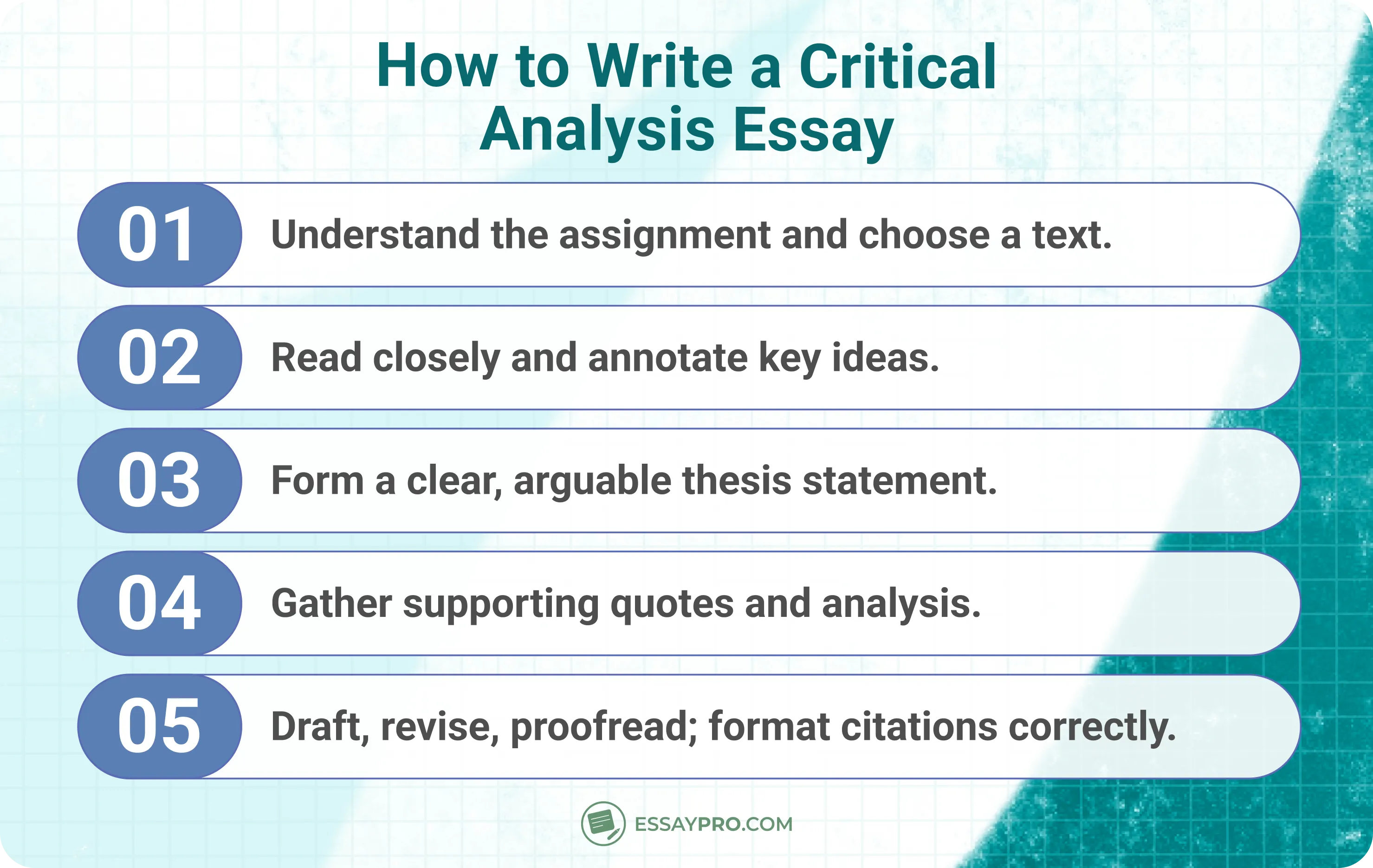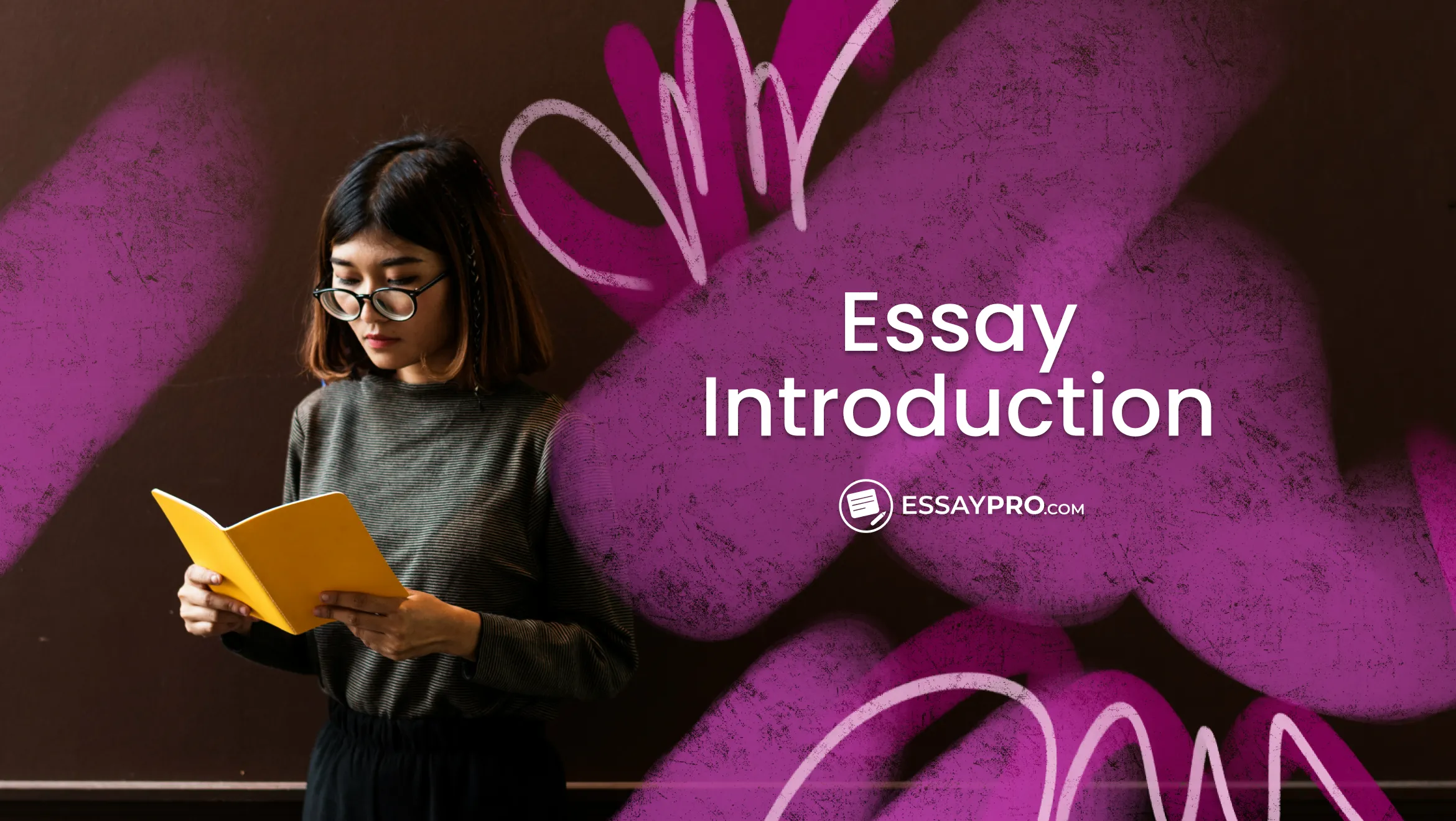A critical analysis essay is a type of academic writing that evaluates and interprets an author’s work by examining its arguments, evidence, and overall meaning. When you write a critical analysis essay, the goal is not only to show what the piece says, but also to uncover how it works and why it’s important.
This article will help you make sense of this type of writing with an example of critical analysis essay and a free PDF file.
If at any point you start to feel overwhelmed, fret not! You can always turn to EssayPro, where you’ll find essays for sale and professional advice for writing.


What Is a Critical Analysis Essay?
A critical analysis essay is an academic paper that examines a text, idea, or work in detail. The purpose of a critical analysis essay is to explain the author’s main argument, evaluate evidence, and interpret meaning while demonstrating the writer’s own critical thinking skills. It goes beyond summary by analyzing how the author presents ideas and whether or not the work effectively supports the main points. This kind of essay measures your ability to think critically and form an independent perspective on the source material.
Critical Analysis Essay Outline
Getting started is always easier when you have a clear roadmap. A critical analysis essay structure gives you exactly that. It shows you where each piece of information should go and how to form the paragraphs correctly, since you know what each of them should accomplish. We created an ultimate outline to give you before you begin writing.
1. Introduction
- Hook or opening sentence to engage the reader
- Provide background information on the author’s work
- State your thesis statement clearly
2. First Body Paragraph
- Topic sentence that introduces the first key point
- Explain the point with analysis and evidence
- Connect back to the main argument
3. Next Body Paragraphs
- Start each with a topic sentence
- Present another point or perspective
- Support with evidence, examples, or data
- Explain how it strengthens your overall argument
4. Counterarguments (optional)
- Briefly discuss opposing views if relevant
- Explain why your perspective remains stronger
5. Conclusion
- Restate the thesis in fresh words
- Summarize the key points from your analysis
- End with a closing thought on the importance of your evaluation
How to Write a Critical Analysis Essay?
Writing a critical analysis essay is a process that combines critical thinking and careful word choices. Here’s how to approach it, step by step:

Define the Author’s Point of View and Style
Ask what problem the author tries to solve and what stance the piece finally takes. Track the audience the prose seems to court and the assumptions it treats as shared knowledge. Point of view is distance, authority, and attitude. Style is the tool kit that carries that attitude: diction, syntax, rhythm, figurative turns, structure.
When you write a critical analysis essay, name those choices precisely and show how they steer meaning. If a short story keeps verbs in the present and cuts articles, the clipped breath may signal urgency or moral alarm.
Make a Claim
A thesis statement in this genre is a testable judgment that uses clear criteria. Decide what counts as success for the author’s work, then argue whether the text meets those standards and why. Good claims narrow the field, carry tension, and forecast the body paragraphs.
Try the because-test: 'X succeeds or fails because A, B, and D.' Push until the sentence names the method, not just the topic. 'The essay persuades through personal narrative' stays shallow. 'The essay persuades because it converts private grief into shared evidence through repeated second-person address and data that interrupts the story at moments of highest emotion,' gives the reader a map.
Create a Nice Intro with a Hook
Open where the heat is highest. Lead with a concrete moment from the source material, a statistic that re-frames the issue, or a tension your paper will resolve. Then, slide into background information the reader truly needs: author, title, brief context, and the central question at stake. End the paragraph with your thesis. Keep it tight so momentum reaches the body without sag.
Draft the Body
Treat each body paragraph as a mini-argument.
- Begin with a topic sentence that advances one part of the main argument, not a label like 'imagery' or 'tone.'
- Move to close reading or evidence analysis, quoting only what you will actually use.
- Then do the hard part many skip: unpack how the quoted detail works.
- Name the technique, tie it to your criteria, and show the causal link to meaning.
- Close by stitching the finding back to the thesis so the paragraph carries weight instead of drifting.
- As you write, order sections for logic, not chronology.
Sometimes the best sequence begins with the strongest leverage point rather than the first paragraph in the source.
Add Evidence
Evidence is the mechanism that lets a reader verify your reasoning. Choose passages, data, or scenes with leverage, where the author’s method and message intersect. Integrate quotes into your own syntax and keep them short when possible. Paraphrase when form matters less than idea; quote when sound, pacing, or word choice carries meaning.
After every piece of evidence, answer the silent question ‘So what.’ Show how the detail supports the claim and why competing readings fall short. Evidence should feel inevitable by the end of the sentence, not merely present.
Sum Up Your Critical Analysis
The conclusion completes the argument by showing how your reading changes understanding. Recast the thesis with the sharper focus gained through analysis, and bring the key points together into a single clear line that highlights the text’s impact on literature, society, or a specific field.
Show how a poem’s choices deepen a theme like grief, identity, or power, or explain how critiquing a study’s method points to new directions for research. And, if the final section feels difficult, our writers can help you shape a strong closing argument!
Revise and Write a Final Copy
Reverse outline to see whether each paragraph advances the main argument.
- Cut any sentence that only repeats the source material.
- Strengthen topic sentences so they carry claims rather than categories.
- Check the voice and keep a consistent third person unless the assignment calls for a different stance.
- Verify citations and formatting, smooth transitions, and test readability by reading aloud.
- Last, examine the first and last sentence of every paragraph in sequence; the skeleton should tell a coherent story before a single quote appears.
Critical Analysis Essay Template
Below, you’ll find a clean, fill-in-the-blank style template for a critical analysis essay, with four main sections: introduction, summary, analysis, and conclusion.
To make sure your introduction starts strong, check out our guide on how to write a thesis statement in more detail.
Critical Analysis Examples for Students
Each critical analysis essay sample below will help your idea become less abstract and much easier to grasp, both for yourself and your reader.
Critical Analysis Essay Techniques
When you’re writing a critical analysis essay, there isn’t just one way to approach a text. Different techniques give you different lenses, and the best essays often mix a few together. Here are some of the most useful ones:
- Close Reading: Focus on details like word choice, imagery, tone, and literary devices to uncover deeper meanings.
- Contextual Analysis: Look at the historical, cultural, or social background of the work to see how it influences the author’s ideas.
- Structural Analysis: Examine how the text is organized, its plot, narrative style, or argument structure, to identify patterns and themes.
- Formal Analysis: Pay attention to literary elements such as symbolism, metaphor, rhythm, or style, and explain how they shape meaning.
- Psychological Analysis: Explore the emotions, motivations, and inner conflicts of characters, or the psychological depth of the author’s perspective.
- Gender and Feminist Analysis: Consider how gender roles, stereotypes, and power dynamics are represented, reinforced, or challenged.
- Social and Economic Analysis: Analyze issues of class, inequality, and power, and how these shape the text’s overall message.
These same techniques apply to longer forms of academic writing, too. That’s why many turn to our professional dissertation writers when working on big research projects; the skills overlap, just on a bigger scale.
Final Thoughts
Once you look at the idea with curiosity, you’ll see the appeal of figuring out how a piece of literature or art is built and what choices matter the most. Practicing this kind of writing means practicing to think.
While it can be fun, getting started or staying focused can be difficult. That’s where EssayPro comes in with writings. Just a simple click will connect you with one of our authors, and the rest will be taken care of professionally!
FAQ
How to Title a Critical Analysis Essay?
Your title should do two things: name the work you’re analyzing and reveal where your focus lies. ‘Critical Analysis of Hamlet’ is less clear than ‘Memory and Madness in Shakespeare’s Hamlet.’
How to Start a Critical Analysis Essay?
Your goal is to start off strong. That means you need a catchy hook, followed by the name of the author, title, and just enough background information to get the reader interested.
Can You Use I in a Critical Analysis Essay?
You can, but it’s not recommended. Most professors request that you write in the third person to keep the tone formal.

Annie Lambert
specializes in creating authoritative content on marketing, business, and finance, with a versatile ability to handle any essay type and dissertations. With a Master’s degree in Business Administration and a passion for social issues, her writing not only educates but also inspires action. On EssayPro blog, Annie delivers detailed guides and thought-provoking discussions on pressing economic and social topics. When not writing, she’s a guest speaker at various business seminars.
- University of Technology Sydney. (n.d.). How to write critically. https://www.uts.edu.au/for-students/current-students/support/helps/self-help-resources/academic-skills/how-write-critically
- University of Waterloo Writing and Communication Centre. (n.d.). Critical analysis and evaluation. https://uwaterloo.ca/writing-and-communication-centre/critical-analysis-and-evaluation
- University of Sheffield. (n.d.). Critical analysis [PDF]. University of Sheffield. https://sheffield.ac.uk/media/31071/download?attachment

.webp)





